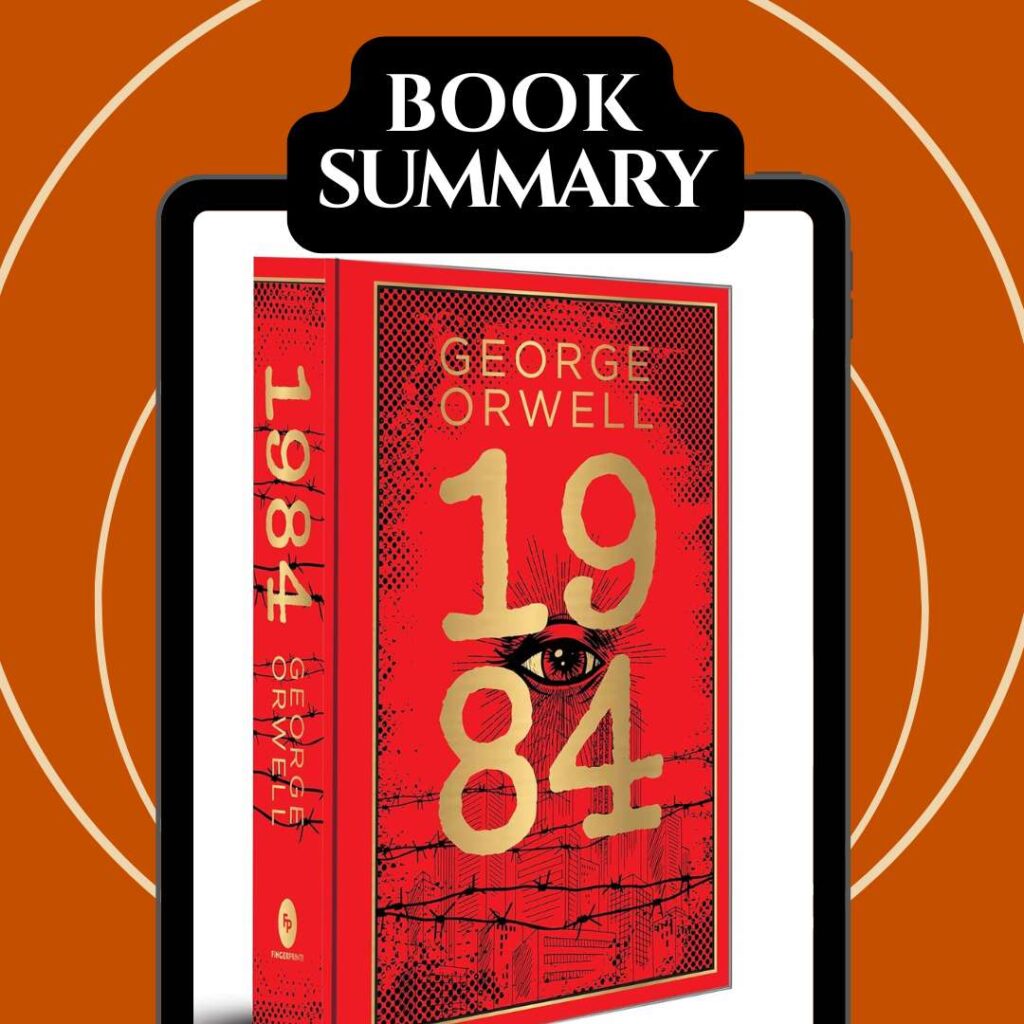1984 book summary
1984 by George Orwell is a timeless classic that has left an indelible mark on literature and popular culture. Set in a dystopian future, the novel explores themes of surveillance, control, and the manipulation of truth. The protagonist, Winston Smith, dares to rebel against the totalitarian regime of the Party, only to face the consequences of challenging the status quo. Through its stark portrayal of a society dominated by Big Brother and the Thought Police, 1984 continues to captivate readers with its chilling portrayal of a world where freedom is a luxury and reality is a construct.

Table of Contents
Author Background
George Orwell, born as Eric Arthur Blair, was a British writer and journalist known for his perceptive views on politics and society. Influenced by his experiences in the Spanish Civil War and disillusioned by the rise of totalitarian regimes, Orwell penned 1984 as a critique of the growing surveillance state and authoritarianism. His own encounters with censorship and propaganda fueled his writing, shaping the bleak and oppressive world depicted in the novel.
Context and Setting
In the world of 1984, the Party reigns supreme in Oceania, a superstate characterized by constant surveillance and manipulation. Citizens live under the watchful eye of the Party, with Big Brother symbolizing the omnipresent leader whose image adorns every corner. The regime employs Newspeak to control and limit language, ensuring the population remains subdued and ignorant of dissenting ideas. Privacy is nonexistent, and individuality is a threat to the Party’s grip on power.
Main Characters
- Winston Smith: The novel’s protagonist, Winston dares to defy the oppressive regime by seeking truth and individuality.
- Julia: Winston’s love interest, Julia represents rebellion and a yearning for personal freedom.
- O’Brien: A high-ranking member of the Party, O’Brien lures Winston into a trap of deceit and betrayal.
- Big Brother: The enigmatic figurehead of the Party, Big Brother embodies the all-seeing, all-knowing entity that governs Oceania.
Plot Summary
- Introduction: Set in a world where propaganda and surveillance dominate, Winston’s quiet rebellion begins as he secretly questions the Party’s authority.
- Winston’s Rebellion: Driven by a desire for truth and freedom, Winston establishes a forbidden connection with Julia, defying the strict rules of the Party.
- O’Brien’s Deception: O’Brien, masquerading as a sympathizer, betrays Winston, revealing the futility of resistance against the Party.
- Shocking Conclusion: Winston’s journey culminates in a harrowing realization of the extent of the Party’s control, leading to a devastating end that underscores the hopelessness of his struggle.
Detailed Analysis and Themes
Surveillance and Control
- Surveillance: In 1984, surveillance is omnipresent, with telescreens in every room monitoring citizens’ activities at all times. This constant surveillance symbolizes the Party’s control over individuals’ lives, fostering fear and conformity.
- Control: The Party employs surveillance as a tool for maintaining control over its subjects, limiting their freedom of thought and action. The theme of control extends beyond physical surveillance to psychological manipulation, exemplified by the Thought Police and the Party’s ability to induce doublethink.
Doublethink and Newspeak
- Doublethink: Central to the Party’s ideology is the concept of doublethink, wherein individuals simultaneously hold contradictory beliefs without acknowledging the inconsistency. This mental gymnastics enables the Party to exert control over reality and truth, blurring the lines between fact and fiction.
- Newspeak: The Party’s language, Newspeak, serves to restrict thought by eliminating words that could challenge its authority. By manipulating language, the Party seeks to limit the range of possible thoughts and ensure conformity to its regime.
Totalitarianism and Censorship
- Totalitarianism: 1984 portrays a dystopian society characterized by totalitarian rule, where the Party’s authority is absolute, and dissent is swiftly suppressed. The novel explores the dangers of unchecked government power and the erosion of individual liberties in such a regime.
- Censorship: Censorship in 1984 is pervasive, with historical records altered to align with the Party’s version of truth. The manipulation of information demonstrates the Party’s control over the past, present, and future, highlighting the destructive impact of censorship on society.
The Concept of Reality and Truth
- Reality: In the world of 1984, reality is subjective and malleable, shaped by the Party’s propaganda and manipulation of information. The novel questions the nature of reality and challenges readers to consider how truth is constructed and distorted in a totalitarian regime.
- Truth: Orwell explores the concept of truth as a weapon wielded by those in power to control the narrative and suppress dissent. By blurring the line between truth and falsehood, the Party undermines the foundation of objective reality, creating a society where truth is a weapon of oppression.
Literary Devices and Techniques
Symbolism of Big Brother
Big Brother: The enigmatic figure of Big Brother symbolizes the Party’s authority and surveillance apparatus. Representing both a leader and an ever-watchful eye, Big Brother epitomizes the totalitarian regime’s control over its citizens’ lives through constant monitoring and manipulation.
The Significance of the Diary
The Diary: Winston’s diary becomes a symbol of resistance and individuality in a society that seeks to eradicate independent thought. Through his clandestine writings, Winston asserts his agency and challenges the Party’s attempts to erase personal identity and memory.
Irony and Foreshadowing in the Narrative
Irony: Orwell employs irony throughout the novel to underscore the absurdity and cruelty of the Party’s regime. From slogans like War is Peace to characters like Syme being vaporized for thoughtcrime, irony serves to critique the contradictions inherent in totalitarian ideology.
Orwell’s Use of Language and Imagery
Language: Orwell’s precise language and vivid imagery enhance the novel’s impact, immersing readers in the bleak, oppressive world of Oceania. Through evocative descriptions and carefully chosen words, Orwell conveys the psychological and emotional toll of living under totalitarian rule.
Critical Reception and Legacy
Initial Reactions to 1984
Controversy: Upon its publication, 1984 sparked controversy for its bleak portrayal of a dystopian future and its critique of totalitarianism. Some critics praised Orwell’s prescient warnings, while others condemned the novel as subversive and dangerous.
Impact on Society and Politics
Cultural Influence: 1984 has had a profound impact on popular culture, influencing discussions around surveillance, censorship, and authoritarianism. Phrases like Big Brother is watching have entered the lexicon, underscoring the novel’s enduring relevance in today’s world.
Ongoing Relevance in the Age of Surveillance and Technology
Surveillance Culture: In an era of surveillance and data collection, 1984 remains a cautionary tale about the erosion of privacy and individual autonomy. The novel’s themes of state control and manipulation of information resonate in the digital age, prompting reflection on the implications of unchecked surveillance.
Adaptations and References in Popular Culture
Cinematic Adaptations: 1984 has been adapted into films, stage plays, and radio broadcasts, further solidifying its place in the cultural landscape. These adaptations have introduced new audiences to Orwell’s dystopian vision and sparked renewed interest in the novel’s themes.
Comparison to Real-Life Events
Parallels between the Novel and Historical Events
Historical Context: Orwell drew inspiration from totalitarian regimes such as Stalinist Russia and Nazi Germany when crafting the world of 1984. The novel’s depiction of state power and surveillance echoes real-life events of the 20th century, highlighting the dangers of unchecked authoritarianism.
Modern-Day Relevance of Orwell’s Warnings
Relevance Today: In an age marked by fake news, propaganda, and digital surveillance, Orwell’s warnings in 1984 resonate more strongly than ever. The novel serves as a cautionary reminder of the dangers of manipulation, censorship, and the suppression of dissent in contemporary society.
Themes of 1984 Still Resonate Today
Timeless Themes: Themes of individual freedom, truth, and resistance in 1984 continue to resonate with readers globally, transcending the novel’s original context. Orwell’s exploration of power dynamics and the struggle for autonomy remains as relevant and urgent today as it was when the book was first published.
Frequently Asked Questions (FAQs) – 1984 Book Summary
What is the main message of George Orwell’s 1984?
George Orwell’s 1984 explores themes of totalitarianism, surveillance, censorship, and the manipulation of truth. The novel serves as a cautionary tale about the dangers of authoritarian regimes and the suppression of individual freedom.
Who is Big Brother in 1984 and why is he significant?
Big Brother is the symbolic leader of the Party in 1984, representing surveillance, control, and propaganda. He symbolizes the invasive and oppressive nature of the totalitarian regime, constantly watching and manipulating the citizens of Oceania.
How does the concept of doublethink play a role in 1984?
Doublethink, a term coined in the novel, refers to the ability to simultaneously hold two contradictory beliefs and accept both as true. It is a key tool used by the Party to maintain power and control over the minds of the citizens of Oceania.
What is the significance of Newspeak in 1984?
Newspeak is the official language of Oceania designed to limit freedom of thought and expression. It aims to eliminate words that could be used for rebellious thoughts, further solidifying the Party’s control over the minds of its subjects.
How does the character Winston Smith challenge the Party in 1984?
Winston Smith, the protagonist of 1984, rebels against the Party’s oppressive regime by engaging in forbidden activities like keeping a diary and having a forbidden love affair. His actions signify a resistance to the Party’s control and conformity.
Conclusion:
1984 by George Orwell continues to captivate readers with its haunting portrayal of a dystopian society ruled by surveillance, manipulation, and oppression. Through its timeless themes and stark warnings about the dangers of authoritarianism, the novel remains a critical piece of literature that invites readers to reflect on the power of truth, freedom, and resistance in the face of tyranny. As society grapples with issues of surveillance and control, Orwell’s masterpiece serves as a poignant reminder of the enduring relevance of its message.
Discover marketing services, interviews & publishing tools at SharingStories.





